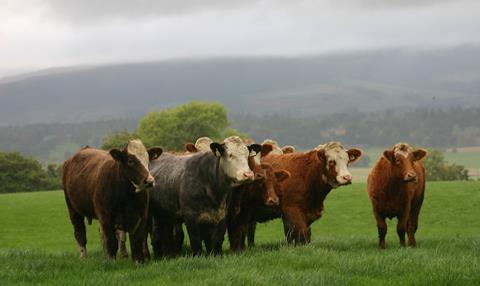A study by eight UK scientists has been welcomed by the Agriculture and Horticulture Development Board (AHDB) as, for the first time ever, it appears to demonstrate in evidence the importance of Global Warming Potential (GWP*) for more accurately assessing the climate impact of methane originating from livestock.

The study, published in Environmental Research, assessed the environmental impact of a pasture-based beef system using an unprecedented range of factors, metrics, assessments and scenarios, including GWP*, which demonstrated a dramatic effect on results.
According to AHDB, the conclusion of the study supports the long-standing view that current Life Cycle Assessments (LCAs) used to assess the environmental impact of foods are far too simplistic and fail to acknowledge distinct nuances within agricultural systems, particularly the characteristics of biogenic methane released by livestock.
Current LCAs convert the impact of different greenhouse gases (GHGs) into CO2 equivalents using the internationally agreed GWP100 (Global Warming Potential over 100 years), established at the 2015 Paris Agreement, of which the UK is legally bound.
However, developed and first made public in 2018 by scientists at the University of Oxford, GWP* is an alternative way of calculating the warming effect of methane, a GHG which unlike CO2 is short-lived, dispersing in the atmosphere after 12 years compared to CO2’s 1,000-year half-life.
"Early analysis by our experts suggests that when applying the more accurate GWP, the warming impact of methane emitted by UK livestock could be much less than currently reported."
Chris Gooderham, AHDB Livestock Science and Environment director.
Its development has gained extensive academic interest, including from the United Nations’ Intergovernmental Panel on Climate Change, which in 2021 announced its intention to review the emerging science, acknowledging that the current methodology in accounting for methane is incorrect.
This most recent study provides significant evidence supporting the adoption of GWP* as it appears to better reflect the actual warming impact of methane on the climate, which AHDB says in turn could have a significant impact on future recommendations to policy makers and consumers.
AHDB’s Livestock Science and Environment director, Chris Gooderham, said: “AHDB welcomes this acknowledgement of GWP* from the scientific community, and as an evidence-based organisation, we support emerging scientific debate and discussion to ensure the accurate measurement of our industry’s impact on the climate.
“Early analysis by our experts suggests that when applying the more accurate GWP*, the warming impact of methane emitted by UK livestock could be much less than currently reported, casting serious doubt on the current narrative that UK livestock are causing global warming.”
This story was originally published on a previous version of the Meat Management website and so there may be some missing images and formatting issues.















